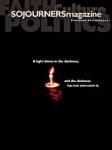‘‘The [Harry Potter computer] game will feature a series of challenges, all inspired by the original book's storyline. These include a 3-D roller coaster ride through Gringotts and a flying broomstick chase…They are given the opportunity to explore numerous 3-D environments...[and] many interactive environments, including moving stairways and secret passageways. And players will be able to walk on foot, climb, jump, and sneak…."
That was someone named David Gibbon writing for the "New Media" section of the BBC Web site. To which I can only reply, "You should have been around my house this summer." Talk about 3-D and interactive. We regularly had up to a half-dozen children tromping around our yard all day in bathrobes, with smudges of red marker on their foreheads, waving magic wands (chopsticks stolen from our kitchen), and riding the stick of every broom and mop they could lay their hands on.
There were regular Quidditch games in which, to simulate flight, the players would sit astride their broomsticks on the swing set and aim for the trees. My 9-year-old son put tape on his glasses and assumed the treasured role of "Harry," and all his friends filled the (good and evil) supporting roles. Even kids who had never read the books got roped into the role-play, and at least one of them started reading because of it. We can never find a broom when we need one, and we're down to two sets of chopsticks, but we're not complaining.
My wife, Polly, and I have three children (ages 9, 5, and 1). And, so far, most of the plagues that go through kid culture (from Rugrats to Pokemon) have passed us over. It's not the lamb's blood on the door that keeps them away. It's simple. We don't have cable, and our rabbit ears only pick up PBS. You couldn't coax a Rugrat out of our TV with a crowbar. And that immediately changes life for the better for everyone in the household.
The eldest product of our little laboratory has not yet complained about being out of the mainstream. He certainly doesn't feel he's missing anything in the World Wrestling Federation. Still, the Harry Potter craze that started a couple of years back came as a relief to his parents. At last, he could be in the mainstream, or even the vanguard, of the latest kid-culture phenomenon. We've even acquired some of the spin-off merchandise via gifts from friends and relatives, and that's okay, too. He has two Potter calendars, a Potter puzzle that is scattered all over the floor at the moment, a Potter board game (which he says is a cheap rip-off of "Clue"), and a Potter trivia game. And this month we will even go see the movie version of the first book (Harry Potter and the Sorcerer's Stone).
"What's the difference?" you might ask. Fads are fads, and merchandise is merchandise. True enough. But the difference is this: Harry Potter came from books, and good ones at that. And when we read books, we create our own imaginary world in our heads-we think for ourselves. At the same time, we share that world with the millions of others who are reading the same thing. That's what happened with my son and with millions of other kids who joined the cult of Potter. And-write this down in lamb's blood-the books don't have any advertising. Not even paid product placements.
The problem with all the commercial, screen-driven (TV or computer) fads is simply that they are commercial and screen-driven. They don't provoke the imagination. They don't demand that you run into the yard and act them out. They tell you what to think. They fill your head with someone else's images. They make kids hide indoors and push buttons, like those cocaine-addicted lab rats in cages. And, at the end of the day, they leave you with a lifestyle built on buying a lot of useless junk you probably can't afford.
As best I can observe, that is how most of America's children are living today. A friend of mine down here calls it a cult of child sacrifice, like the Old Testament one dedicated to Moloch. Except our Moloch is Time-Warner-AOL and Disney uber alles.
Danny Duncan Collum, a Sojourners contributing editor, teaches writing at Rust College in Holly Springs, Mississippi.

Got something to say about what you're reading? We value your feedback!